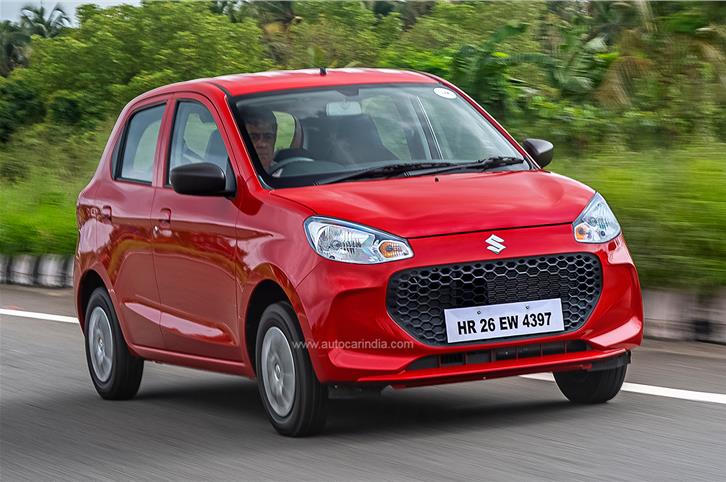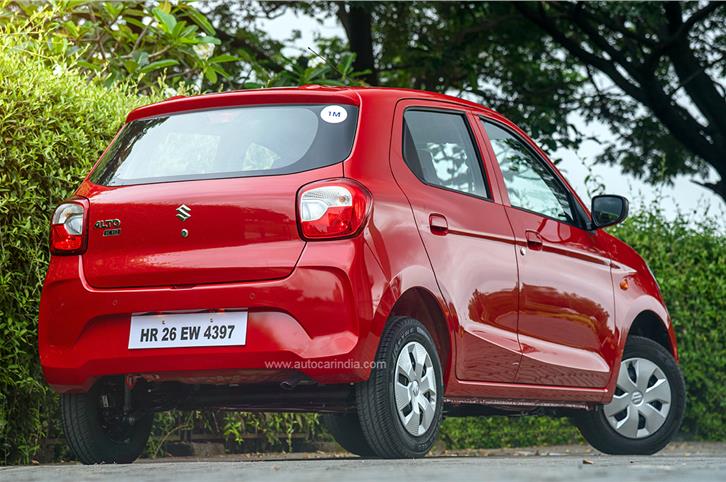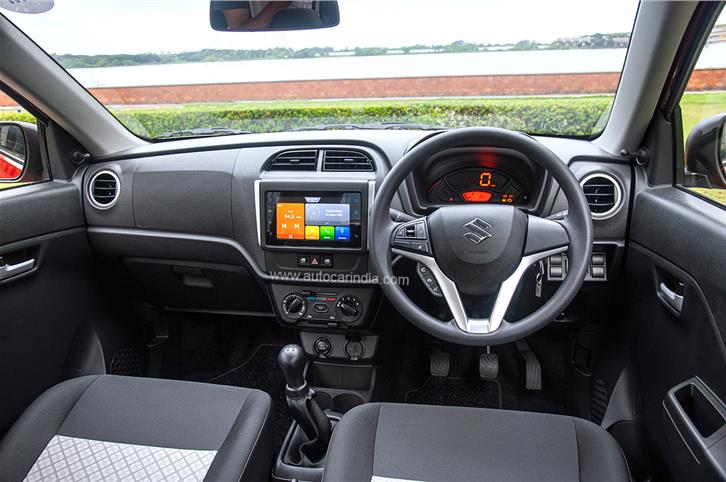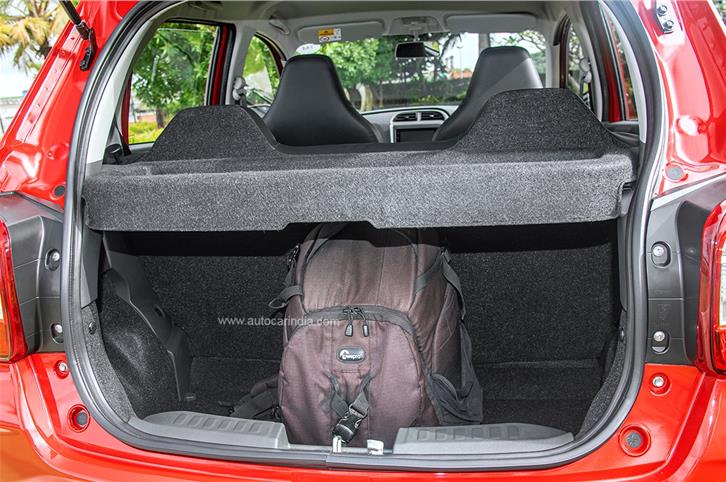With a more fuel-efficient engine and a bigger price tag, can the venerable Alto still pull in first-time buyers?
Published on Aug 24, 2022 04:00:00 PM
79,166 Views
Follow us on



It may not have the celebrity status once enjoyed by the very successful Maruti 800, or the very unsuccessful Tata Nano, but the undisputable fact is that the Suzuki Alto, based on the sheer numbers it has sold, is by far the most successful car in the 75-year history of the Indian auto industry. The Alto is the true people’s car, having given personal mobility to millions – 4.3 million customers to be exact – but this unpretentious budget hatch wears its enormous achievement quite lightly on its small fenders.
So when a new Alto comes along after a decade, it should be a momentous occasion for affordable mobility, except that budget cars these days are not so affordable and need a far bigger budget. The cost of material and a raft of regulatory requirements and equipment has pushed car prices through the roof. Maruti Suzuki has tried to insulate the new Alto K10 from these cost rises, which impact cars at the bottom end of the market the most, and to that end has priced the standard entry variant at an attractive Rs 3.99 lakh. However, moving up the spec ladder to the variants most people want, the Alto sees a substantial jump in price and tops out with a not-so-cheap Rs 5.84 lakh VXi+ automatic. Sure, you do get a fair amount of equipment as standard, but for a car that has price at the core of its appeal, can the all-new Alto K10 continue to pull in the entry car buyer?
The immediate impression is that the all-new Alto has a lot more wow factor than its predecessor, which incidentally continues to sell with the 800cc engine. Based on the same Heartect platform as the S Presso, the new Alto K10 bears no resemblance to the older car and, in fact, it is an all-new, grounds-up design. It has a new found cuteness, looks refreshingly cheerful and yet doesn’t stray far from the conservative Alto buyer’s tastes.
 Cheerful looks give the Alto K10 a fresh appeal.
Cheerful looks give the Alto K10 a fresh appeal.
The focal point of the design is the nose which has a lot of Swift in it. The large hexagonal grille, sleek lights and a subtly sculpted chin certainly makes the Alto stand out, but there are no fog lights or DRLs even on top-spec models. The C-shaped cutouts in the bumper suggest they may house some form of auxiliary lighting in the future. The gently raked C-pillar makes the car look sportier than the previous Alto that had a more upright rear, while the simple looking tail-lights don’t break from convention. Mild sculpting and character lines give the sides of the car some relief, but the 13-inch wheels appear a bit dwarfed and one size smaller under the high window line. Overall, the new Alto has a well-balanced and nicely rounded design that is sure to appeal to its mass customer base.
The interior design is pretty straightforward and doesn’t stand out like the exterior. The talking point here is the all-digital instrument cluster obviously inspired by the Kwid. The cluster is the same as the one in the S Presso – except that in the latter, it’s placed on the centre console, while the new Alto has it behind the steering wheel. It’s pretty basic though and all you get is a speedometer and fuel gauge and a cluster of warning lights which does away with the need for other gauges. There’s no tachometer either, which the previous K10 had, but, quite frankly, does an Alto owner really want one?
 Alto K10 gets a digital instrument cluster borrowed from the S-Presso.
Alto K10 gets a digital instrument cluster borrowed from the S-Presso.
The steering wheel design is sportier than before and now has volume and phone controls, while the power window buttons have been moved to the dashboard and are quite convenient to operate. The dash itself is a bit more sculpted and not one big slab of plastic like in the previous Alto, and that results in more knee room for the front passenger.
Steering-mounted controls limited to volume and phone functions.
This, however, has come at the expense of the glovebox which is smaller than before but is still sufficiently spacious to hold your essentials. The centre console has a pair of cup holders and two small cubby-holes which won’t hold more than a small smartphone. The door pockets are generous for one-litre bottles but rear passengers don’t get that luxury and have to manage with pockets on the back of the front seats. The overall plastic quality is quite decent for a budget car and hard-wearing to withstand years of use.
No door pockets or power windows at the rear.
The Alto’s narrow cabin has always been short on space, but the new model did surprise us with the amount of legroom and headroom on offer in what is dimensionally the smallest car in the market. At the rear, headroom is pretty good, as is knee room and clearly the new model benefits from the 20mm increase in wheelbase. Under thigh support is pretty good too, but sitting three abreast is next to impossible and hence the Alto is a four seater at best.
 Very impressive headroom and legroom at rear comes as a pleasant surprise.
Very impressive headroom and legroom at rear comes as a pleasant surprise.
Upfront the seats are comfortable enough, all the controls are logically laid out and fall easily to hand. There is no height adjust for the driver’s seat even on the top-spec models but you don’t sit too low. Short drivers may have an issue with the high dashboard, but visibility is pretty good thanks to the car’s slim A-pillars and compact dimensions, which makes the Alto ideal for threading through narrow, crowded lanes.
 Front seats are quite comfy, and though there’s no seat height adjust, you don’t sit too low.
Front seats are quite comfy, and though there’s no seat height adjust, you don’t sit too low.
Boot capacity is a paltry 214 litres and the load lip is quite high which makes it inconvenient to load heavy bags. What’s good is that the boot is smartly designed allowing you to make full use of the limited space on offer and you can actually fit in quite a bit of luggage and if you flip down the single piece rear seat back rest can there’s room for a lot more.
Equipment wise, the Alto K10 gets the basic essentials like power steering, gearshift indicator, remote central locking, body-colored bumpers and door handles, and intermittent wipers.
 SmartPlay infotainment system common with other Suzukis; front power windows shifted to dashboard.
SmartPlay infotainment system common with other Suzukis; front power windows shifted to dashboard.
The SmartPlay infotainment system is the same as in the S-Presso and gets Android Auto and Apple CarPlay. Whilst we can accept the absence of power windows at the rear and manually adjustable outside rear view mirrors, what is unacceptable is no dimmer for the inside mirror which we think is a basic and indispensable safety item. There’s no rear wash-wipe system either, which seriously compromises visibility in the monsoon months. Speaking of safety, the new Alto only gets the standard dual front airbags, ABS and EBD, front seat belt pretensioners and rear parking sensors.
The Alto K10 is powered by a one-litre, three-cylinder, all-aluminium motor that is now the mainstay of Maruti’s entry-level range. The new engine has been updated to meet the latest emission norms, including the stricter BS6 Phase 2 standards, which come into effect next April. The Alto K10 comes with two transmission options, a five-speed manual and a five-speed automated manual transmission which Maruti calls AGS (for Auto Gear Shift). The manual makes the most of the feisty 67hp motor and from the get go, the Alto accelerates quite vigorously and you won’t complain about a lack of punch. On the open road, you do have to make good use of the five intelligently spaced ratios to overtake and this engine feels strongest in the top half of its rev range.
 Brilliant one-litre, three-cylinder engine gives the Alto lots of pep.
Brilliant one-litre, three-cylinder engine gives the Alto lots of pep.
The engine gets quite audible the harder you rev it, but it never sounds harsh or strained and, in fact, this one of the sweetest three-cylinder naturally aspirated engines in the market. Part throttle response is pretty good too and in the city, gentle dabs of the throttle pedal are enough to let you keep up with the flow of city traffic. It’s only in a stop and go, bumper-to-bumper environment where you have to constantly get on and off the throttle that you experience a bit of low-speed jerkiness, the result of an aggressive ‘tip-in and tip-out’ calibration in the interests of fuel economy.
 Light controls and good all-round visibility makes the Alto easy to drive.
Light controls and good all-round visibility makes the Alto easy to drive.
Fantastic fuel efficiency is one of the fortes of the Alto K10 and something owners not only expect but also demand and in this key area, the Alto doesn’t disappoint. With a certified figure of 24.39kpl for the manual and 24.90kpl for the automatic, the Alto is the most fuel efficient budget car today.
 Alto feels unsure at high speeds because of vague steering and choppy ride.
Alto feels unsure at high speeds because of vague steering and choppy ride.
After the manual, the AGS-equipped Alto K10 feels a bit lethargic in comparison with distinct pauses between gear shifts especially in through the lower gears, but for the most part, it's very smooth for a single clutch, automated manual and shows how much Maruti Suzuki has improved this technology over the years. The AGS is quite responsive to kickdown but overtaking on the highway needs a bit more planning. In city traffic, the AGS works very well and steps off the line very smartly with a creep function that works exceedingly well. As a result, its quite easy to modulate the throttle whilst inching forward in rush hour traffic. If there’s a grouse it’s a bit of vibration you feel when the clutch engages, the result of a low idle speed set in the interests of fuel efficiency.
Light, nimble and compact with a tight turning circle, nothing beats the Alto when it comes to threading through narrow, crowded lanes. It’s easy to park, can slot into small gaps and takes the stress out of driving when you’re jostling for road space with bikes, rickshaws, pedestrians and other cars. For a small car it tackles bad roads exceedingly well too and you’ll be surprised how it dives in and out of large potholes with aplomb. Fantastic ground clearance, short overhangs and a short wheelbase, give the little Alto a capability that would embarrass some SUVs.
 Alto tackles bad roads with an aplomb that would embarrass some SUVs.
Alto tackles bad roads with an aplomb that would embarrass some SUVs.
Cushioning you nicely from shocks are the high-profile 145/80 R13 tyres, which have distinctly taller sidewalls than the previous K10. The steering is light and requires little effort, but is quite devoid of feel and suffers from a lot of slack around the straight ahead position.
 Alto rolls a fair bit when pushed hard, but at low speeds feels predictable and safe.
Alto rolls a fair bit when pushed hard, but at low speeds feels predictable and safe.
While this is not an issue in city traffic, the steering doesn’t inspire much confidence at high speeds. The ride too gets quite choppy on a bumpy road and you have to constantly make corrections at the wheel at speed. Under hard braking too, the Alto, though it stops effectively, it shimmies a bit especially if the surface is uneven. It’s clear that the Alto doesn’t have the planted, secure feel of a bigger car and it's best to limit your speed on the highway.
The Alto K10 is an honest car that delivers on all its promises. Yes, there are several compromises, notably a lack of overall space and it’s no longer as affordable as it once was. But the core values of the Alto still remain intact. It’s an incredibly stress free car that’s easy to live with, easy to drive and cheap to own and run. It is surprisingly capable too in all enviroments, which makes it a good all-purpose car that first time car buyers will certainly appreciate. The new design has injected a fresh dose of appeal which will surely win more buyers, and that is why the company is quietly confident that the indomitable Alto will go back to where it belongs – at the top of the sales chart.
Also see:
2022 Maruti Suzuki Alto K10 video review
Copyright (c) Autocar India. All rights reserved.

Maruti Suzuki plans to use the Boosterjet engine in more models. Which one would you like to see it in?
Comments
Member Login
Personal Details
No comments yet. Be the first to comment.